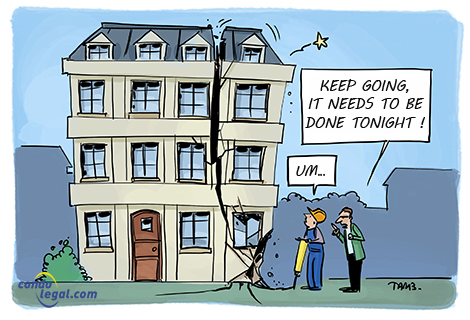Initiative of the work

Works carried out in common portions concern the entire community of co-owners, which is why they are often managed by the syndicate. Not only is this action consistent with its purpose and mission (article 1039 of the Civil Code of Québec), which aims to ensure the maintenance and preservation of the immovable, but it also stems from an onerous liability that falls on the syndicate, should the works be poorly executed, for example. In this context, the syndicate must act with diligence and prudence to avoid negative impacts on the safety and value of the property.
Mandatory work
As a result of its legal obligations, the syndicate must have the necessary work to safeguard the immovable carried out. The nature of the work can be varied: retrofitting elevators and attending to the water tightness of the immovable, replacing the roof or windows and consolidating foundations (e.g. underground parking), to name just a few.
This being said, the syndicate faces additional issues when work must be done in the co-ownership, regarding the safety of property and persons, cleanliness or the building structural soundness. There may be a risk of collapse during the work, in which case additional precautions should be taken. For all these reasons, the syndicate must plan operations diligently, and also define the financial framework thereof.
Work requested by a co-owner
Work in common portions may also be required by a co-owner, such as in the case he would like to open the wall of a common portion, or propose a modification on its roof terrace, of which he has the exclusive enjoyment as a common portion for restricted use. But before proceeding, it will (generally) be necessary to obtain the authorization of the meeting of the co-owners. However, in order for a decision to be taken on this issue, the co-owner concerned must send his request to the Board of Directors, who will put it on the agenda of the meeting of co-owners. His application must contain the following information:
- A description of the work;
- Useful details as to the nature of the work (expansion, improvement or alteration of the common portions);
- All supporting documents, such as plans and specifications, the opinion or recommendations of a building professional;
- A resolution to be voted by the meeting of the co-owners..
This mailing must be done several weeks before the meeting of the co-owners, to allow the board of directors to insert this question on the agenda. If the directors do not respond, the co-owner concerned may request that it be added thereon, within 5 days of receipt of the notice of meeting.
Anyone who requests that work be done could call a Special Meeting, provided that one or more co-owners representing 10% of the votes of all the co-owners make the request. Such a scenario could be considered if the board of directors does not want to hold a meeting of the co-owners.
Court imposed work
If the preservation of the immovable is at stakes, or urgent, to the point of causing a prejudice to the co-owner concerned (in the event of failure to perform the work), the latter may force the syndicate to act. For example, in the case of water infiltration originating from the common portions in his apartment, a co-owner could put his syndicate on a formal notice to act. The directors will have to act upon it, failing which the applicant could bring a legal action. This lawsuit would require the completion of the work and, possibly, compensation for losses suffered.
 WHAT YOU SHOULD KNOW ! If the proposed work affects common portions or changes the destination of the immovable, any co-owner requesting them must obtain the approval of the syndicate. This means that a vote must be taken by the meeting of the co-owners.
WHAT YOU SHOULD KNOW ! If the proposed work affects common portions or changes the destination of the immovable, any co-owner requesting them must obtain the approval of the syndicate. This means that a vote must be taken by the meeting of the co-owners.
 WHAT TO KEEP IN MIND : Although it is not the owner of the common and privative portions, the syndicate of co-owners has the obligation to have carried out the required work in the immovable, in order to avoid its deterioration.
WHAT TO KEEP IN MIND : Although it is not the owner of the common and privative portions, the syndicate of co-owners has the obligation to have carried out the required work in the immovable, in order to avoid its deterioration.
 WARNING ! Various stakeholders may compel the syndicate of co-owners to act, if it continues to refuse that necessary (or emergency work) work be carried out in the immovable. It could be the co-owners themselves, the syndicate’s property and casualty insurer, the Régie du bâtiment du Québec or the municipality.
WARNING ! Various stakeholders may compel the syndicate of co-owners to act, if it continues to refuse that necessary (or emergency work) work be carried out in the immovable. It could be the co-owners themselves, the syndicate’s property and casualty insurer, the Régie du bâtiment du Québec or the municipality.
Back to the mega-factsheet Work of the syndicate